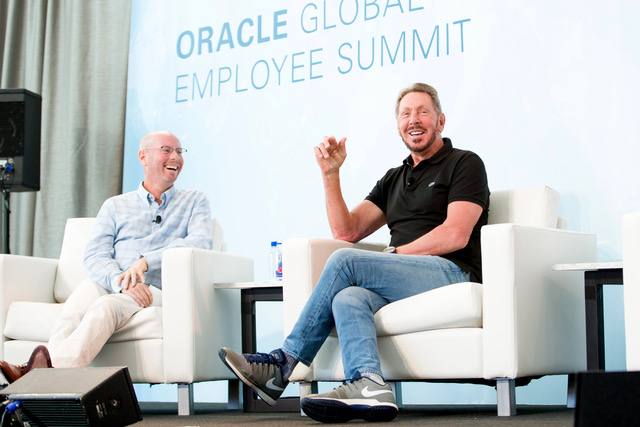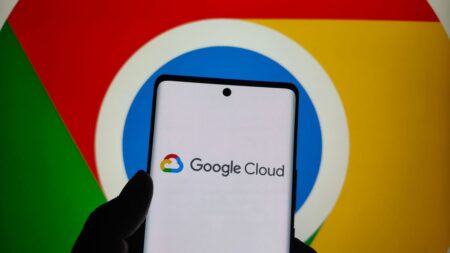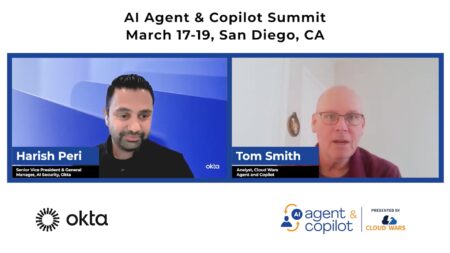Across his 30-year odyssey with Oracle then NetSuite and now Oracle NetSuite, founder Evan Goldberg has not only had a legendary business career but also an unparalleled relationship with Larry Ellison that’s come full circle from employee to cofounder to cofounder and back to employee.
Credited with starting the world’s first cloud-applications company, NetSuite, back in 1998, Goldberg led the small-business ERP pioneer for 18 years before Oracle acquired NetSuite in 2016
And recently, 5 years after NetSuite was acquired by Oracle, Goldberg offered a colorful set of perspectives on lessons learned, success and failure, persistence, vision, and the sometimes-intertwined attributes of leadership and partnership.
I’ve pulled out close to 20 highlights from that Zoom interview with Goldberg, and within each of those excerpts I’ve highlighted in italics a core insight or lesson offered by Goldberg, who worked at Oracle for 8 years in the developer team and rose to the level of VP before leaving to become an entrepreneur in partnership with Ellison.
Actually, before the two launched NetSuite, Goldberg started and Ellison funded a company called mBed that offered rich website development over the web. But after 3 years, mBed wasn’t able to become self-sustaining so Goldberg and Ellison shut it down and launched NetSuite to help small businesses automate and gain deep visibility into their operations.
Goldberg combines that remarkable 31-year history with the instincts of a great storyteller, and the result are some keen insights into what Oracle CEO Safra Catz recently called the largest cloud ERP company in the world (Oracle) and the second-largest cloud ERP company in the world (NetSuite).
The Dawn of the Internet Age
“I sort of saw a lot of the early growth of Oracle because I started when they were just a few hundred employees. And when I left, they were multiple thousands. Over those eight years I got to see that super rapid growth and also some of the roadblocks and pitfalls you can have as you’re a fast-growing company. So, that was really interesting, but it was right at the sort of dawn of the internet age. And I really wanted to do something to take advantage of this whole new medium.”
First startup: lessons learned despite failing
“So I left Oracle and started a company that was all about building rich, interactive websites using some of the same kind of techniques that I’d learned as part of Oracle. And I was lucky enough that Larry actually helped me on that venture. Now, while that venture didn’t succeed, it taught me a lot about running a business and what it’s like to be a CEO and some of the challenges there. And I took a lot of that learning and that’s what was sort of the impetus for NetSuite.”
Good idea, bad timing
“I was certainly cognizant of the fact that even though I might have a great idea, it might be the wrong time. And that’s sort of what it was. It was all about timing. So, whenever a business fails, it’s super challenging emotionally and can be financially. I mean, I put a lot of money into that first company. And it’s hard when you have to cut employees—it’s really, really hard. And so one thing that I came out of that experience with was that technology should not be holding you back if you’re a fast growing business.”
The need for rich information
“The lack of technology should not be the reason that you don’t succeed. It won’t be the reason that you do succeed—that’s going to be your great idea and your execution on that idea and whatever product or service you have that’s transforming whatever industry you’re in. That’s what’s going to make you succeed. But if you don’t have rich information about your business and you’re not able to sort of keep control as you grow, that can be something that can cause you to fail.
“So that was a big learning I took from that, because the tools for fast-growing startups were woefully lacking. And I kind of imagined that big companies have these great tools, these great applications, and I was familiar with Oracle’s applications. And if you look closely at big companies and their technology, while there’s a lot that can be improved there, at least they had sort of a system of record typically, and that kind of stuff.”
Filling a “massive hole” in the market
“But as a startup, we didn’t even have those basics—I mean, we had like five different customer lists. And I couldn’t even tell you if someone was a customer or not—it was like, ‘Maybe—I think they paid us money, but I’m not sure for what.’ And so that really drove me to say to Larry, ‘I want to shift gears.’ I realized that our timing wasn’t right on that first idea, and I told Larry, ‘I don’t think we’re going to make it. There’s a competitive company that was bought by a much larger competitor and they just have much more marketing power than we do. But I’ve learned a ton and I want to shift gears to doing business software, because I think there’s a huge missing massive just hole there for companies like mine.”
Shared vision to automate hundreds of thousands of small businesses
“Larry really jumped on that because he had been thinking at the exact same time that what the world needed was small-business accounting software delivered on the web—that was his big idea. Larry said, ‘Wow, this is great because if I were to do a startup right now, it would be small business accounting, something like QuickBooks, but on the web, because these companies don’t want to have to deal with computers and installing software and new versions and we should do it all for them. And databases too—they don’t want to deal with databases.’ And I remember thinking how that showed significant self-awareness from Larry that people don’t actually want to deal with databases.”
Pushing the idea beyond accounting
“So I was like, ‘Great, but I also want to do sales software so people can know where their next deal is coming from, what their pipeline looks like.’ And Larry said, ‘Oh yeah, we’ll have to do front-office apps as well.’ So in his mind, the company was already done. But he explained, ‘We’ll have to do back office first and we’re going to have to do web stores also, because these companies are going to want to sell on the web and it’ll be an entire suite.’ And this was—and I’m serious—a 5-minute phone conversation. And we’ve stuck with that sort of vision even though this was really very early—I mean this was even a few months before Salesforce.com started.”
Larry Ellison’s long-range vision
“Larry was very early with complete conviction that all software was going to be delivered over the web for the next 1,000 years—he said, ‘I don’t know what’s going to happen after that, but definitely for the next 1,000 years.’ And that was really his kind of vision and what he was thinking about deeply at the time. He was doing some stuff with Oracle in areas like that, but this notion of building something for smaller companies, that seemed like a great test bed. So that was a case when the timing was really right—unlike the previous company, I think we got the timing pretty well right on NetSuite.”
Giving entrepreneurs “everything they need to know”
“What I especially wanted to do was give the entrepreneur or founder just one single place that they can go with everything they need to know and everything they sort of need to do. And we built accounting and we built CRM and we built the web store, but really when the rubber hit the road for NetSuite was when we built something called the executive dashboard, which was just all the key information about all these different pieces in one place where you could go in your browser anytime anywhere and see, ‘Oh, here’s what’s happening with my company.’ ”
The ability to drill into the numbers to make better decisions
“So you have everything in one place, and if you don’t like some of the numbers, you could drill down on them and see what’s behind these numbers. And to me, that was what was sorely lacking when I started my first company—as I said, I think without that precision you’re kind of swimming in a fog, I guess, to mix metaphors. But you can’t figure out what your next move should be if you really don’t know what’s going on in your business. Knowing that stuff won’t necessarily make you succeed, but not knowing it can definitely make you fail.”
Combine and conquer
“We started actually in late ’98 so it was almost an 18-year run as an independent company. We went public on the New York stock exchange, we had this very exciting ticker symbol, and we were very excited about that. That was super fun. Don’t get me wrong—it was really fun being an independent company, no doubt about it.
“But in 2016, Larry really felt that it was the right time to combine the companies so that together we could see more success, especially in the area of cloud ERP and related applications like HCM, CRM, etc., because I think he knew, and I always felt this way too, you can’t really have one product to serve every size business. The software that’s running General Electric or whatever, name your massive company, that’s not going to work for a fast-growing startup with 10 people. So, I think there was a recognition that across Oracle and NetSuite, the market needed to have at least two different solutions. And I think that’s borne itself out with the success we’ve had. So, coming back, Larry was convinced that it was the right time that we’d be able to share technology and leverage each other’s learning and have both products.”
Keeping an open mind
“For me, I was like, okay, I’ve worked at Oracle before, and I wasn’t really thinking I’d be working there again. But Larry asked me to stay for a year. And he said, ‘Maybe after a year, you’ll find that things are different here and you want to stay longer.’ So I approached that with an open mind and that turned out to be the case. Now, there was definitely a lot of adjustment to not being an independent company. For one thing, you just have to think about the overall enterprise. I mean, you can’t just, you have this sort of tunnel vision like you might have when you’re independent. So, that’s certainly been a bigger change, but Oracle has been really good about letting us stay sufficiently independent that we can keep our focus on what we do and develop the strengths of what we do, because it’s pretty different.”
Blending autonomy with interdependence
“We sell to pretty different size and types of organizations than most of the other teams at Oracle do, and there are some things that we need to do different. And I think the larger company has recognized that and let us operate in sufficiently and independent manner that we can be successful in our markets, but also with the right connectivity into the rest of the organization so that we can leverage so much of what Oracle is doing. For example, we’re a huge user of the Oracle Database and we’re able to work with the database team to make sure we’re doing it the best way.”
The benefits of Oracle Cloud Infrastructure
“I’m working with the Oracle Cloud Infrastructure team because we’re a customer of OCI and we’re real believers in it. I mean, the promise that OCI gives to us is similar to what we give to our customer. We say, ‘Don’t worry about running software and running databases and upgrades. We’ll take on all that burden for you.’ And that’s kind of what OCI does for us: they say, ‘Don’t worry about plugging in computers and where they’re going to be and getting contracts for data centers—we’ll do that all for you.’
“And that’s been great because in the same way that using NetSuite allows our customers to focus more on what they really need to do, instead of trying to tie together all kinds of disparate information, OCI lets us focus on what we really need to do, which is providing the best possible service to our customers. So there’s been a lot of cross-collaboration and cross-pollination. They’re doing some amazing stuff in AI. This is something I would never have expected in a million years when I came back to Oracle that they’re becoming a leader in user experience for business applications.”
“A great combination of independence and collaboration”
“Oracle has just done a massive investment and sort of changed some priorities to really put the business user first. Not that they didn’t do that before, but it’s been really accelerated. And the stuff they’re doing with their user experience team, I mean, we’re just leveraging it and it’s fantastic. And I mean, the thing is, is that there’s a lot of things that are different about different types of applications and enterprise applications and in small business or mid-sized business applications. But some things are similar, like how you want to submit an expense report is the same at big companies and small companies, which is that nobody wants to submit an expense report. Instead, you want to just charge your card and have it dealt with, and you don’t have to even think about it.
“Behind the scenes, how expenses get handled may be massively different for a 50-person company versus a 50,000-person company. But at the front end for the user, it’s all about just ease of use and the less they have to deal with things, and the more they can focus on what they’re truly in business for, the better. So, I think it’s a great combination of independence and collaboration.”
Since acquisition, customer base has doubled
“We’ve been really, really pleased—we’ve doubled our customer base since the acquisition and the numbers are accelerating 24%, 26% growth year on year. And it’s a testament to the belief that Larry has and that Oracle has in what we’re doing now. And it sure helps to have the same founder—that’s not often the case when companies get acquired. Larry came and talked with our engineers early on in the acquisition and they were like, ‘Boy, he really seems to understand what we do.
And I’m like, ‘Well, yes! He’s the co-founder with me and we’ve been collaborating the whole time.’ ”
Leveraging great Oracle technology, such as Analytics Cloud
“We’re leveraging some great technology that’s appropriate for our customer base. We have the NetSuite Analytics Warehouse, which is based on Oracle’s Analytics Cloud and the Autonomous Data Warehouse. And so combining the products in the right way for the right user, the right kind of product/market fit has really helped accelerate our growth and provide a better service to our customers.”
Staying true to the mission for 23 years
“But at the end of the day, we know where we sit. We sit with companies, fast-growing startups that are hoping to go public someday or hoping to become much bigger companies and change the world in whatever industry they’re in. We just stay really, really focused on that. And that was always who we were targeting the whole time. So, again, Larry and I had a 5-minute phone conversation where we said we’re going to target these fast-growing businesses with a suite of applications that all work together in the cloud. And we’ve just stayed singularly focused on that for 23 years.”
This article is brought to you by Oracle.








